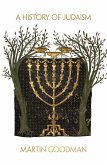Phyllis Chesler
The New Anti-Semitism
27,99 €
inkl. MwSt.
Versandfertig in 2-4 Wochen

14 °P sammeln
Phyllis Chesler
The New Anti-Semitism
- Broschiertes Buch
- Merkliste
- Auf die Merkliste
- Bewerten Bewerten
- Teilen
- Produkt teilen
- Produkterinnerung
- Produkterinnerung
"Anyone who wants to understand the connection between anti-Semitism, Islamic terrorism, the role of propaganda and appeasement must read this book. Natan Sharansky, author, The Case for Democracy: The Power of Freedom to Overcome Tyranny and Terror
Andere Kunden interessierten sich auch für
![Anti-Semitism before the Holocaust Anti-Semitism before the Holocaust]() Albert S. LindemannAnti-Semitism before the Holocaust41,99 €
Albert S. LindemannAnti-Semitism before the Holocaust41,99 €![Jews and Muslims in the Islamic World Jews and Muslims in the Islamic World]() Jews and Muslims in the Islamic World45,99 €
Jews and Muslims in the Islamic World45,99 €![Anti-Semitism (Interlink Illustrated Histories) Anti-Semitism (Interlink Illustrated Histories)]() Roberto FinziAnti-Semitism (Interlink Illustrated Histories)22,99 €
Roberto FinziAnti-Semitism (Interlink Illustrated Histories)22,99 €![You Gentiles You Gentiles]() Maurice SamuelYou Gentiles21,99 €
Maurice SamuelYou Gentiles21,99 €![A History of Judaism A History of Judaism]() Martin GoodmanA History of Judaism20,99 €
Martin GoodmanA History of Judaism20,99 €![Twelve Tribes Twelve Tribes]() Ethan MichaeliTwelve Tribes20,99 €
Ethan MichaeliTwelve Tribes20,99 €![Regional Identities and Cultures of Medieval Jews Regional Identities and Cultures of Medieval Jews]() Regional Identities and Cultures of Medieval Jews43,99 €
Regional Identities and Cultures of Medieval Jews43,99 €-
-
-
"Anyone who wants to understand the connection between anti-Semitism, Islamic terrorism, the role of propaganda and appeasement must read this book. Natan Sharansky, author, The Case for Democracy: The Power of Freedom to Overcome Tyranny and Terror
Hinweis: Dieser Artikel kann nur an eine deutsche Lieferadresse ausgeliefert werden.
Hinweis: Dieser Artikel kann nur an eine deutsche Lieferadresse ausgeliefert werden.
Produktdetails
- Produktdetails
- Verlag: Gefen Publishing House
- Seitenzahl: 300
- Erscheinungstermin: 15. März 2015
- Englisch
- Abmessung: 242mm x 169mm x 19mm
- Gewicht: 536g
- ISBN-13: 9789652298096
- ISBN-10: 9652298093
- Artikelnr.: 41973117
- Herstellerkennzeichnung
- Libri GmbH
- Europaallee 1
- 36244 Bad Hersfeld
- gpsr@libri.de
- Verlag: Gefen Publishing House
- Seitenzahl: 300
- Erscheinungstermin: 15. März 2015
- Englisch
- Abmessung: 242mm x 169mm x 19mm
- Gewicht: 536g
- ISBN-13: 9789652298096
- ISBN-10: 9652298093
- Artikelnr.: 41973117
- Herstellerkennzeichnung
- Libri GmbH
- Europaallee 1
- 36244 Bad Hersfeld
- gpsr@libri.de
You can't say she didn't warn us. In 2003, the liberal feminist Phyllis Chesler published The New Antisemitism. It was partly a reaction to the events of 9/11, partly a protest against the left's anti-Israel posture posture amidst the terror of the second intifada. But it was also the culmination of a lifetime of struggle as Chesler was forced, again and again, to confront the unique bigotry that had been embraced by those she had regarded as comrades in the push for women's rights. Chesler, a Breitbart News contributor, is re-releasing The New Antisemitism a decade later, as a third intifada looms, and as the hatred of Jews that motivates radical critics of Israel no longer feels the same need to hide behind the "anti-Zionist" label. Since 2003, Israel built its security barrier and withdrew from Gaza, only to be targeted by Hamas rockets and tunnels; Iran has made dramatic advances in its quest to become a nuclear power; and the Palestinians have refused to come to terms. What has remained constant throughout is the refusal of Western elites to defend their own principles against the Islamist threat in general, particularly in the Israeli-Palestinian case. In their effort to accommodate the "other," they are prepared to sacrifice Israel, and so enable a bloodthirsty form of Jew-hatred that is supported by Palestinian officials and found gruesome expression in Tuesday's terror attack on rabbis praying in a West Jerusalem synagogue. I asked Chesler if she blamed Palestinian Authority President Mahmoud Abbas for the attack, as Israel's Benjamin Netanyahu has done. "Abbas and the Palestinian state-run media both in the West Bank and Gaza are wholly responsible for the ceaseless incitement which is meant to justify and lead to the genocidal slaughter of Jews," she said, noting that much of The New Antisemitism is devoted to exposing that propaganda. "I hope and pray that the world is more receptive to this analysis than it almost was fifteen years ago when I first began working on this." Does President Barack Obama--as some have alleged--share the blame? "President Obama is certainly culpable in his purposeful and yet oddly detached 'even-handedness, '" she replied. "In his speech condemning [Tuesday's] atrocity, by stating that there have been 'Palestinian deaths and Israeli deaths, ' that 'most Palestinians and most Israelis want peace...' he fails to tell the truth. "The highly indoctrinated Palestinians, who live under the rule of barbaric tyrants, do not want peace with infidels, certainly not with infidel Jews, definitely not with Jewish Israel... Palestinians on the West Bank and in Gaza were celebrating the heroic martyrdom of the two murderers, cousins, who worked in a nearby grocery store in Har Nof. Only people incited and indoctrinated could enter a synagogue and start hacking as well as shooting people to death." Chesler is a keen observer of propaganda and its power in the Middle East. She has seen far more deeply than most into the contemporary realities of life in the Islamic world, having once been married to--and trapped by--a Muslim man in pre-Soviet, pre-Taliban Afghanistan. Yet her most poignant insights, perhaps, in The New Antisemitism are her stories of antisemitism on the American and European left, as the oldest hatred enjoyed a new renaissance in a new guise. "These kedoshim [saints] who were murdered while at prayer...were murdered because they were Jews, religious Jews," she says. "[Palestinians] are allowed to do so by a world that has been completely brainwashed by Big Lies which in turn have been funded for more than sixty years. The war of ideas, what Richard Landes and I call "cognitive warfare" is the hottest war we face." Chesler's book is a compelling and highly readable chronicle of a journey through the hypocrisy of the left as its irrational hostility to Israel has grown. She still considers herself part of that broad political alignment, particularly feminism, though she is frustrated and wounded by her colleagues' blind anti-Israel--and, in many cases, antisemitic--prejudice. "What some feminists have done is to misapply feminist concepts in the service of demonizing Israel," she notes, pointing out an example of a feminist who likened the Israelis to "pimps" and "johns," describing Palestinians as the world's exploited "prostitutes." ("I could not make this up and it gives me no joy to share this information with you)," Chelser adds. What frustrates her most deeply is the futility of the left's anti-Israel obsession--since, Chesler says, what happens to Israel and the Jews will soon happen to Christians, secularists, and the West in general at the hands of an Islamist fundamentalism that has no interest in dialogue, much less feminism. "The American and European Left have made a marriage in hell with their Islamic terrorist counterparts," she writes. "The same Left that still has never expressed any guilt over its devotion to communist dictators, who murdered 100 million of their own people in the service of a Great Idea, has now finally, fatefully joined the world jihadic chorus in calling for the end to racist Zionism and to the Jewish apartheid state." What the left and the jihadists share, she says, is self-criticism expressed as rage, a rebellion against some authorities but worship of others. In seeking to criticise--and yet safe--a tattered internationalism, Chesler embraces her "tribal" identity as a Jew and an American. Her book contains foreign policy facts, but is also written in a personal tone, drawing on encounters with old friends (and new adversaries). Even 11 years later, though a bit dated by events, Chesler's book remains a prophetic, and necessary, warning to us all.







